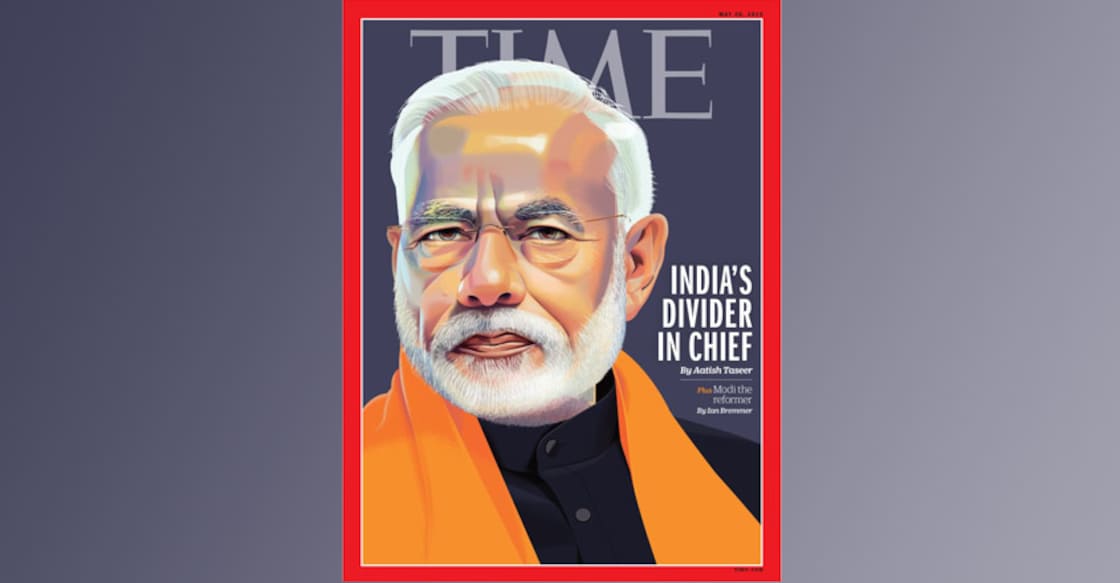'India's Divider in Chief ': Time magazine's cover on Modi may kick up row

Mail This Article
New Delhi: American news magazine Time has featured Prime Minister Narendra Modi on the cover page of its May 20 issue with a headline that may create controversy across India amid the election season.
The headline reads "India's Divider in Chief" and carries a caricature of Modi.
This title on the cover pertains to an article in the magazine, written by Aatish Taseer, with the headline "Can the World's Largest Democracy Endure Another Five Years of a Modi Government?"
The write-up compares former Prime Minister Jawaharlal Nehru's idea of secularism with the prevailing social "stress" under Modi who "demonstrated no desire to foster brotherly feelings between Hindus and Muslims."
Besides, the article also recalls the Gujarat riots that claimed lives of scores of people.
The whole article is based on the Hindu-Muslim relations and blames Modi for being pro-Hindu.
It is not the first time the magazine has made critical commentary about Modi. In an article in 2012, the magazine described him as a controversial, ambitious and shrewd politician.
Modi critics latch on to the issue
The Mahila Congress, the women's wing of the main opposition party Indian National Congress, tweeted about the Time's cover, stating “Sitting PM makes it to the cover of Time Magazine”. The Mahila Congress also added, “Your truth is for all to see,” tagging Modi.
Aam Aadmi Party leader Preeti Sharma Menon reacted to the Time cover by tweeting, “Yayyy! All the bhakts must be so excited. Modiji is on @TIME's cover page”.
Activist-lawyer Prashant Bhushan also tweeted about the Time cover.
Rise of populism
Taseer places the rise of Modi in the context of populist sentiment seen in countries across the world. Taseer writes, “It forces us to reckon with how in India, as well as in societies as far apart as Turkey and Brazil, Britain and the US, populism has given voice to a sense of grievance among majorities that is too widespread to be ignored...”
Taseer refers to Modi's inability to bring economic growth and usage of Hindutva. Taseer notes Modi “has in every field, from politics and economics to Indology itself, privileged authenticity over ability, leading India down the road to a profound anti-intellectualism.”
Taseer concludes on an ominous note, “Modi’s India feels like a place where the existing order of things has passed away, without any credible new order having come into being. Modi has won—and may yet win again—but to what end?”
Some praise too
The Time issue on Modi has two prominent articles. The other article by political scientist Ian Bremmer, titled "Modi Is India's Best Hope for Economic Reform", is far more conciliatory to the incumbent prime minister. While noting that Modi's economic record has been mixed, Bremmer argues, “India still needs change, and Modi remains the person most likely to deliver.” He praises Modi's work to improve infrastructure and initiatives such as the expansion of Aadhaar, Swachh Bharat and the Ujjwala Yojna.
Interestingly, Modi has featured on the cover of Time Magazine earlier also. In May 2015, Time had an image of Modi with the headline "Why India matters". The issue also featured an interview with Modi.
Modi's predecessors have also featured on the cover of Time Magazine. In July 2012, the magazine had Manmohan Singh on the cover, calling him an “underachiever” for his perceived inability to accelerate economic reforms.
In July 2002, Time had caused a flutter in Indian politics when it published an article that raised questions about the health and lifestyle of then prime minister Atal Behari Vajpayee and his capacity to govern. The article, "Asleep at The Wheel?", led to protests by the BJP against the magazine.

